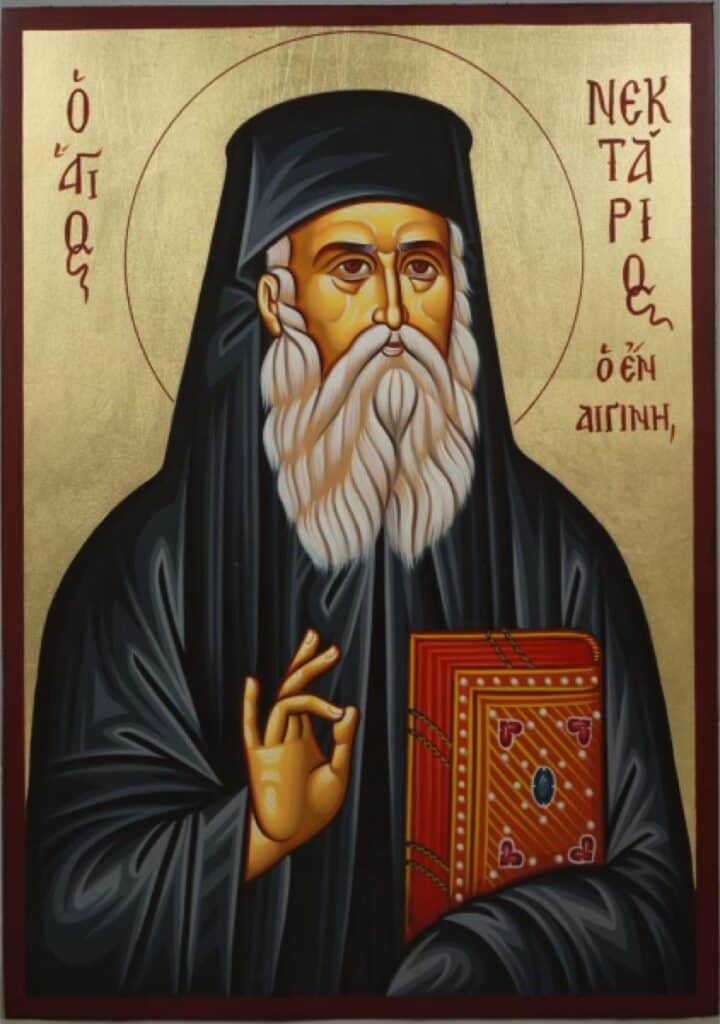The Season of Lent is a special time for us Christians. It’s a time to take a deep breath and spend some quality quiet time to remember what Jesus Christ has done for us through his passion, death, and resurrection. Without that, our faith would be in vain, as St. Paul tells us (see 1 Cor. 15:14).
The day after Ash Wednesday, the reading from the Gospel of Luke (9:22-25) tells us, “If anyone wishes to come after me, he must deny himself and take up his cross daily and follow me.” I’ve been thinking and praying about this invitation of Jesus a lot lately as I’ve had some challenging situations in my own life that could benefit from an attitude adjustment on my part.
Then, I was invited to view the new film, “Man of God,” about someone I had never heard of, the Eastern Orthodox saint, St. Nektarios of Aegina. As I watched his story unfold on the screen, Jesus’s invitation to “take up your cross daily and follow me,” was coming to life in a very profound way through this man’s holiness as he faced persecution, not from people outside the Church, but from within. As I watched the film, the idea of seeing my own challenges as “crosses” that Jesus was inviting me to take up, began to let me see these struggles as opportunities to journey with Jesus as he carried his own cross to Calvary. An attitude adjustment, indeed.
“Man of God” has an encore presentation in theaters for one more day only, Monday, March 28th through Fathom Events, and if you’re looking for some Lenten inspiration, please consider seeing this film. Click here for more information about showings in your area.
Written and directed by Serbian/American Yelena Popovic and starring Greek actor Aris Servetalis as Nektarios, Russian actor Alexander Petrov as Kostas (Nektarios’s close friend and confidante), and American actor Mickey Rourke as a paralyzed man who is healed upon Nektarios’s death), the film is a true international collaboration and celebration of faith and holiness.
Nektarios (Servetalis) was a metropolitan in the Orthodox Church in the late 1800’s. (For us Latins, that’s the equivalent of a bishop). He was serving in Egypt when the leaders of the Church decided to exile him for no good reason. Because Nekarios was friends with the poor and with local Muslims, his overt Christian charity and popularity among the common people, made the higher-ups nervous (and perhaps, jealous), not unlike the reception Dorothy Day received from Church hierarchy when she first started serving the poor, which was less than favorable.

Exiled to Greece, Nektarios was unable to find a position in the church as slanderous letters preceded him. He finally took a position as preacher on a remote island with people who didn’t want to listen to his words. When he became a teacher at a high school for young men considering priesthood, he met Kostas (Petrov), who became his assistant and was responsible for publishing his writings on Ethics and Christian living, all of which were well received by the populace. They developed an amazing friendship as it seemed like Kostas was the only one Nektarios could count on.
One of his great accomplishments was the establishing of a monastery on the Island of Aegina. A group of young women desiring to become nuns approached him, asking him to be their spiritual advisor. As he worked with them to establish the monastery, which is still active to this day, his work garnered more opposition from church leaders who unjustly accused him abusing the nuns. For more information on the monastery, check out their Facebook page here.

His greatest suffering, however, was never knowing what he had done to warrant his exile. He wrote to the Patriarch and the bishops asking why, but never received any answers to his inquiries. His greatest gift to history was his example and never-tiring ministry to good deeds for others over the course of his life without fail.
None of us are immune from struggles and suffering in this life. Lent is a God-given time for us to reflect on how we handle the suffering in our lives. Do we seek to blame God or someone else for our suffering? Do we exhaust ourselves trying to get rid of our suffering? Or do we accept suffering as a part of life? The life of Saint Nektarios, so beautifully portrayed in the film “Man of God,” shows us the power of accepting suffering and living it with faith in Christ, who first suffered for each of us.
Perhaps you could think of just one of the sufferings you are experiencing right now. It could be a physical suffering such as an illness, a terminal disease, headaches, or joint pain. It could be an emotional suffering such as resentment, grief, or anger. It could be situational suffering such as a broken relationship, struggles at work, or dealing with a frustrating person in your life. Whatever your suffering, think of how Saint Nektrarios endured his suffering with faith in God. Think of the invitation of Jesus to “take up your cross daily and follow me.” Perhaps you might spend some time in prayer asking God to help you endure your suffering. If you can’t make that step, then just try asking God for the willingness to be open to God’s action in your life.

The filmmakers voiced their hope for this movie: “Even in his (Nektarios’s) last moment on earth was used to help another: upon his death, Nekarios’s undergarment was removed, and as it fell upon the paralyzed man in the hospital bed next to him, the lame man arose to walk. So, too, do we hope “Man of God” will awaken the paralyzed faith in audiences around the world.”
If your faith needs a little boost, consider experiencing “Man of God” in theaters on March 28th. Perhaps you will find the strength you need to take up your own cross as we continue to journey through this Season of Lent. God bless you.
Click here for Sr. Nancy Usslemann’s review of “Man of God.”


